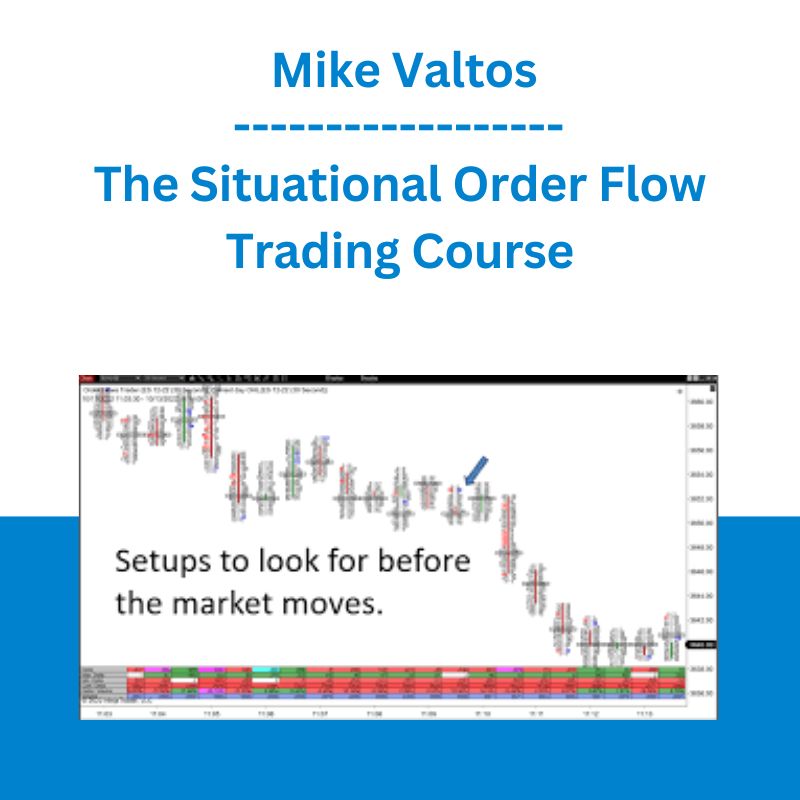*** Proof of Product ***
Exploring the Essential Features of “Mike Valtos – The Situational Order Flow Trading Course”
Mike Valtos – The Situational Order Flow Trading Course
What You Will Learn About in Strategic Order Flow
Module 1 – Combining Price Action with Order Flow.
When most people hear the term “price action,” they think of technical analysis and chart patterns. While price action can certainly be used to identify key levels and potential trade setups, it’s only part of the picture. Price action alone can be a bit misleading. By considering order flow as well, you can get a better sense of who is really in control of the market and where prices are likely to go next. In order to get a complete picture of what’s happening in the market, you need to combine price action with order flow.
Module 2 – Signs the Market Is About to Shift Based on The Order Flow.
The market is constantly shifting and it can be tough to keep up. However, if you know what to look for, you can get ahead of the competition. Many people think that the stock market is completely random and unpredictable. However, there are certain signs in the order flow that can give a trader clue that the market is about to shift. By keeping an eye on the order flow, you can get a better sense of which way the market is likely to move next.
Module 3 – Order Flow Patterns That Can Help You Catch the Next Big Move.
Order flow is the net buying or selling pressure at any given price level. When there’s more buying pressure than selling pressure, the price will move up. And when there’s more selling pressure than buying pressure, the price will move down. By studying different order flow patterns, you can get a feel for how strong the buying or selling pressure is at any given price level. This can give you an edge in making trading decisions.
Module 4 – When Order Flow Is Sending Mixed Messages.
When order flow is sending mixed messages, it can be difficult to know what to do. If you’re trying to trade based on the order flow, you may end up taking trades that go against the dominant trend. So, what can you do when order flow is sending mixed messages? by understanding a few key concepts, you can learn to read the market and make informed trading decisions. One important thing to remember is that order flow reflects the current sentiment of traders. When you see order flow sending mixed messages, pay attention to the type of orders that are coming in and how they might be affecting the price action.
Module 5 – How to Detect Market Manipulation in The Footprint.
Most people don’t think about market manipulation when they place a trade. They expect the price they see on their screen is the true representation of the market. Unfortunately, that’s not always the case. Market manipulation is when traders artificially move the price in order to profit from the resulting price movement. It’s illegal, but it still happens. Often times traders get ahead of themselves and when they take a bad trade blame it on manipulation.
Module 6 – Structural & Active Order Flow.
Most traders are familiar with the concept of order flow – the buying and selling activity of market participants that results in changes to price. What is less well-known, however, is that there are two types of order flow: structural and active. Structural order flow is the underlying buying and selling pressure that exists in the market at any given time. It is the net result of all the trading activity that has taken place over a given period of time, and it represents the true supply and demand in the market. Active order flow, on the other hand, is created by traders who are trying to take advantage of short-term imbalances in the market. It is often generated by large institutions that are looking to execute trades quickly and efficiently. Active order flow can have a significant impact on prices in the short-term, it is ultimately the structural order flow that determines the long-term direction and turning points of the market.
Module 7 – Order Flow Price Pattern Setups.
If you want to be a successful trader, it’s important to have a few go-to Order Flow Price Pattern Setups that you feel comfortable with. That way, when the markets are moving fast and you don’t have time to think too much, you can still make trade decisions quickly and confidently. There are many different types of order flow price patterns and set ups to use, so it’s up to you to experiment and find which ones work best for you. As you become more familiar with order flow trading, you’ll likely develop your own preferred setup. But in the meantime, it’s a good idea to have a few go-to’s that you can rely on.
Module 8 – Keeping Risk at Bay.
No matter how good you are at finding trading, trading or timing the market, if you don’t keep risk at bay, you can blow up your account in an instant. That’s why it’s important to always be aware of the risks invoved in trading, and to take steps to mitigate those risks. Focus on quality over quantity. It’s better to make a few smart, high-probability trades than to try to trade every little move in the market.
Module 9 – Wrapping It All Up.
To wrap it all up, order flow is the study of how traded orders move through the market. It’s a way to track the Supply and Demand of a market, which can give traders an edge in making informed decisions about when to buy and sell. By understanding order flow, traders can better anticipate price movements and execute their trades with greater precision. While there is no surefire way to predict the markets, studying order flow is one tool that can help give traders an edge. By now you will begin to develop your own trading strategies. The markets are always changing, and it’s important to be adaptable in your approach.
Please see the full list of alternative group-buy courses available here: https://lunacourse.com/shop/










 Dave Landry - Stock Selection Course
Dave Landry - Stock Selection Course  Oliver Velez - Essential Strategy Of Trade For Life
Oliver Velez - Essential Strategy Of Trade For Life  Ed Ponsi - Forex Trading
Ed Ponsi - Forex Trading  Nicholas Kardaras - Tech Addiction in Children & Adolescents: Brain-Based Interventions to Optimize Digital Health in Today's Screen Culture - PESI
Nicholas Kardaras - Tech Addiction in Children & Adolescents: Brain-Based Interventions to Optimize Digital Health in Today's Screen Culture - PESI  Matthew Kratter - Trader University
Matthew Kratter - Trader University  Sovereign Man Confidential - Renunciation Video
Sovereign Man Confidential - Renunciation Video  Alphashark - The AlphaShark SV-Scalper
Alphashark - The AlphaShark SV-Scalper  Money Miracle - George Angell - Use Other Peoples Money To Make You Rich
Money Miracle - George Angell - Use Other Peoples Money To Make You Rich  Forexmentor - Recurring Forex Patterns
Forexmentor - Recurring Forex Patterns  Erik Banks - Alternative Risk Transfer
Erik Banks - Alternative Risk Transfer  Team NFT Money - Ultimate NFT Playbook
Team NFT Money - Ultimate NFT Playbook  Emanuele Bonanni - My Trading Way
Emanuele Bonanni - My Trading Way  Women FAQ - Joan Rolson
Women FAQ - Joan Rolson  SMB - Options Training
SMB - Options Training  Atlas API Training - API 570 Exam Prep Training Course
Atlas API Training - API 570 Exam Prep Training Course  The High Cholesterol Action Plan - Chris Kresser
The High Cholesterol Action Plan - Chris Kresser  Jesse Livermore Trading System - Joe Marwood
Jesse Livermore Trading System - Joe Marwood  The Daily Traders – Exclusive Trading Mentorship Group
The Daily Traders – Exclusive Trading Mentorship Group  George Fontanills & Tom Gentile - Optionetics 6 DVD Series Home Study Course (Digital Download)
George Fontanills & Tom Gentile - Optionetics 6 DVD Series Home Study Course (Digital Download)  Crypto Dan - The Crypto Investing Blueprint To Financial Freedom By 2025
Crypto Dan - The Crypto Investing Blueprint To Financial Freedom By 2025